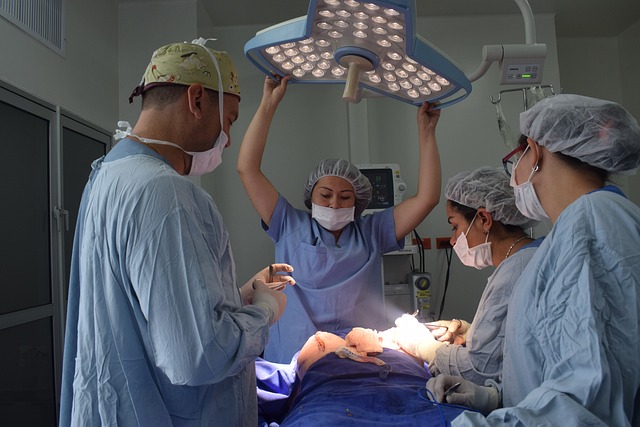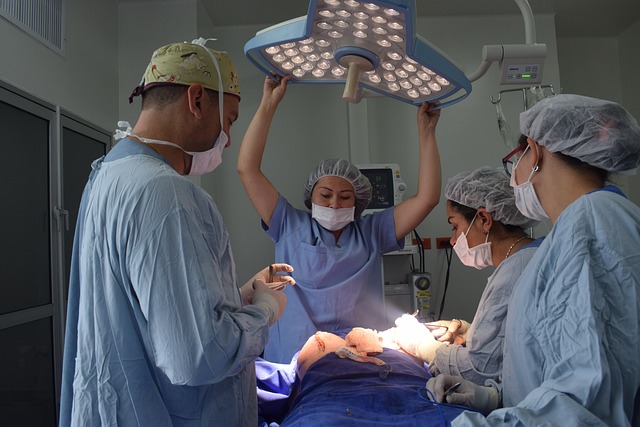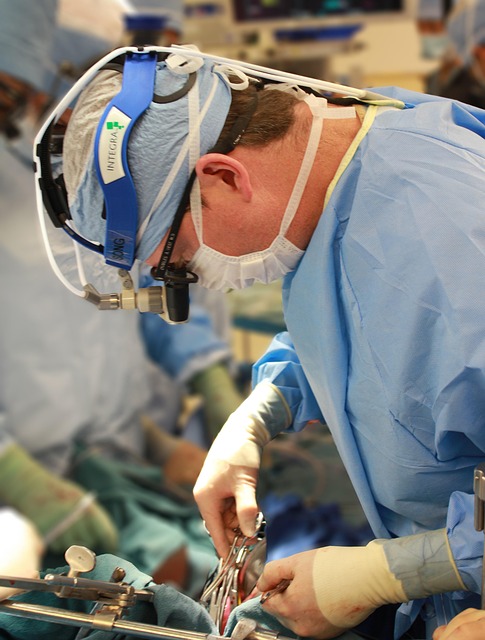The dynamic plastic surgery market thrives on targeted marketing, with Pay-Per-Click (PPC) advertising as a powerful tool. By strategically focusing on cosmetic procedures and patient demographics, surgeons can attract qualified leads. Keyword research, precise targeting, and optimized landing pages enhance PPC campaigns. Effective ad copy, bid optimization, and performance tracking maximize ROI. Integrating PPC with email, social media, and content marketing creates a comprehensive strategy. Ethical navigation, transparency, and adherence to healthcare regulations are crucial for successful and trustworthy plastic surgery marketing.
“Unleash the power of Pay-Per-Click (PPC) advertising to drive targeted traffic and boost leads in the competitive plastic surgery market. This comprehensive guide navigates the strategies and tactics for successful PPC campaigns, from understanding your audience to optimizing landing pages and ad copy. Discover how to define ideal patients through keyword research and targeting, allocate budgets effectively, and integrate PPC with other marketing channels. Embrace best practices, ethical considerations, and data-driven adjustments for a game-changing plastic surgery marketing strategy.”
Understanding Plastic Surgery Market and Target Audience

The plastic surgery market is a dynamic and diverse industry, catering to a wide range of clients with varying needs and motivations. Understanding this market involves delving into its unique aspects, such as the popularity of cosmetic procedures among individuals seeking enhancement or restoration, and the growing demand for specialized treatments like breast augmentation, rhinoplasty, and facial rejuvenation. Effective plastic surgery marketing leverages these trends by focusing on targeted demographics, highlighting successful outcomes, and emphasizing patient satisfaction.
When it comes to targeting audiences, plastic surgery practitioners must consider factors like age, gender, socio-economic status, and geographic location. For instance, younger adults often seek procedures for aesthetic reasons, while older patients might be motivated by reconstructive needs. Employing strategic PPC (pay-per-click) advertising allows precise targeting of these demographics through carefully crafted campaigns that speak directly to the specific concerns and desires of potential clients. This ensures that marketing efforts are not only effective but also cost-efficient in generating qualified leads for plastic surgery practices.
Benefits of Pay-Per-Click (PPC) Advertising for Plastic Surgeons

Pay-Per-Click (PPC) advertising offers numerous advantages for plastic surgeons looking to boost their online visibility and attract potential clients. By leveraging targeted keywords related to specific procedures, like “breast augmentation” or “face lift,” surgeons can precisely direct their marketing efforts to those actively searching for such services. This highly focused approach ensures that every click on the ad represents a genuine interest from a prospective patient.
Moreover, PPC campaigns provide tangible results with measurable ROI (return on investment). Surgeons can track conversions, monitor click-through rates, and adjust strategies accordingly in real-time. This data-driven approach allows for continuous optimization, ensuring marketing dollars are spent effectively. In the competitive landscape of plastic surgery marketing, PPC provides a dynamic and responsive strategy to stand out, capture leads, and ultimately increase patient acquisition.
Defining Your Ideal Patients: Keywords and Targeting Strategies

Defining your ideal patients is a crucial step in successful PPC for plastic surgery leads. To effectively target potential clients, start by envisioning the demographic and psychographic characteristics of your dream patient. Consider age range, gender, location, income level, and any specific concerns or goals they might have related to plastic surgery. This detailed understanding allows you to create highly targeted ad campaigns using relevant keywords that resonate with these ideal patients.
In plastic surgery marketing, leveraging the right keywords and targeting strategies is key to reaching the right audience. Use keyword research tools to discover terms your target market searches for when considering procedures. Incorporate these keywords into your PPC ads, landing pages, and website content to improve visibility in search engine results. Additionally, leverage demographic and behavioral targeting options offered by advertising platforms to narrow down your reach to individuals most likely to convert.
Building High-Converting Landing Pages for PPC Campaigns

In the competitive realm of plastic surgery, a well-crafted landing page can be a game-changer for PPC campaigns. High-converting landing pages specifically tailored to potential patients seeking plastic surgery leads can significantly enhance the effectiveness of your advertising efforts. Focus on creating visually appealing and informative content that speaks directly to the target audience’s concerns, desires, and expectations.
Optimize these pages with relevant keywords, such as “plastic surgery marketing,” to ensure they rank higher in search engine results. Include compelling calls-to-action (CTAs) that encourage visitors to take the next step, whether it’s scheduling a consultation or requesting more information. A seamless user experience, fast loading times, and mobile responsiveness are also essential to capturing leads effectively in today’s digital era.
Crafting Compelling Ad Copy that Converts

Crafting compelling ad copy for plastic surgery PPC campaigns is an art that combines understanding your target audience with a deep grasp of search engine algorithms. In the competitive world of plastic surgery marketing, every word must resonate with potential clients searching for procedures. Ad copy should not only highlight the services offered but also address the specific concerns and desires of those considering cosmetic enhancements.
Use strong, action-oriented language that speaks directly to the benefits patients seek—whether it’s achieving a more youthful appearance, boosting confidence, or enhancing symmetry. Incorporate keywords naturally throughout your ad text, focusing on relevant search terms potential clients might use when researching plastic surgery procedures. This strategic approach ensures your ads appear at the top of search results, increasing visibility and driving conversions for your practice.
Optimizing Bids and Budget Allocation for Maximum ROI

In the competitive landscape of plastic surgery marketing, optimizing PPC bids and budget allocation is key to achieving maximum ROI. By carefully analyzing search trends, competitor strategies, and patient demographics, surgeons can bid strategically on relevant keywords that attract highly qualified leads. This ensures that advertising spend is focused on potential patients most likely to convert, maximizing return on investment.
Additionally, dynamic bidding strategies and automated tools can help streamline the process, allowing for real-time adjustments based on performance data. Efficient budget allocation means directing funds towards ad channels and campaigns that deliver the best results, further enhancing overall marketing effectiveness in the competitive world of plastic surgery marketing.
Analyzing Campaign Performance and Making Data-Driven Adjustments

In the dynamic landscape of plastic surgery marketing, understanding campaign performance is paramount. By analyzing key metrics such as click-through rates (CTR), conversion rates, and cost per acquisition, professionals can gain valuable insights into what’s resonating with their target audience. This data-driven approach allows for precise adjustments to PPC strategies, ensuring every ad dollar counts. For instance, identifying underperforming keywords or ads can lead to more targeted campaigns, boosting efficiency and ROI.
Regular performance evaluations enable practitioners to make informed decisions, optimizing their plastic surgery marketing efforts continuously. Incorporating A/B testing for ads and landing pages further refines the strategy, offering personalized experiences that cater to potential patients’ unique preferences. This iterative process not only enhances overall campaign effectiveness but also aligns with the latest trends in digital marketing, ensuring a strong online presence in a competitive industry.
Integrating PPC with Other Marketing Channels for Comprehensive Strategy

In the realm of plastic surgery marketing, a multifaceted approach is key to attracting and converting potential clients. Pay-per-click (PPC) advertising stands as a powerful tool when integrated seamlessly with other marketing channels. By combining PPC with email campaigns, social media engagement, and content marketing, surgeons can create a comprehensive strategy that reaches patients at every stage of their journey. For instance, PPC ads can drive targeted traffic to a website optimized with blog posts and case studies, fostering education and building trust.
This integrated approach ensures a consistent brand message across all platforms. A prospective patient encountering the plastic surgery clinic on social media, seeing engaging content, and then clicking on a tailored PPC ad is more likely to convert than someone who lands on a randomly optimized webpage. Thus, optimizing each channel to work in harmony magnifies the overall effectiveness of marketing efforts, making it a vital strategy for any successful plastic surgery practice.
Ethical Considerations and Best Practices in Plastic Surgery PPC Marketing

In the realm of plastic surgery marketing, Pay-Per-Click (PPC) advertising presents a powerful tool for attracting potential patients. However, it’s crucial to approach this strategy with ethical considerations and best practices in mind. The sensitivity of the procedures and the personal nature of patient outcomes demand a responsible marketing approach.
One key aspect is ensuring transparency in ad campaigns. Clearly communicating the potential risks, recovery times, and outcomes associated with surgical procedures is essential. Additionally, targeting the right audience is vital; using relevant keywords and demographics ensures that ads reach those genuinely interested in plastic surgery, avoiding any mislead or inappropriate promotions. Compliance with healthcare regulations and guidelines, such as those set by the FDA, should be strictly observed to maintain integrity and patient trust in PPC campaigns for plastic surgery leads.
